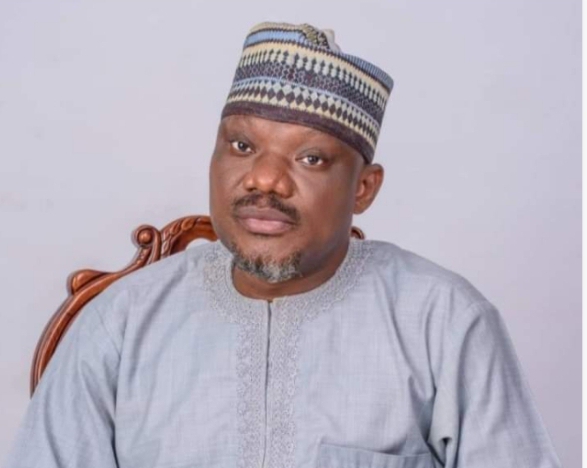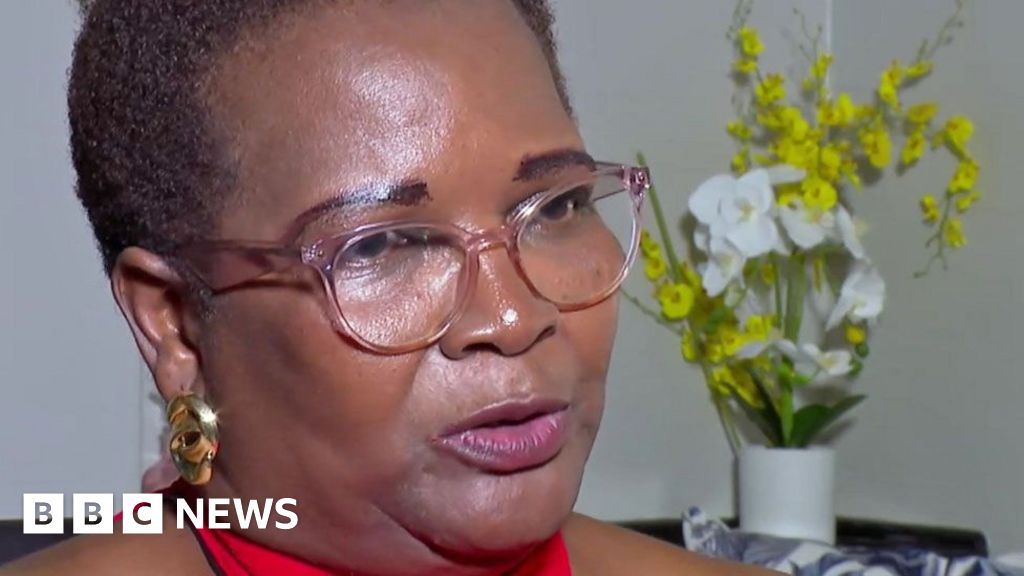Movie stars Patience Ozokwor, Mama G and the late John Okafor, Mr Ibu, were the perfect on-screen couple. Not only did they star in some of Nollywood’s biggest films, but they also boast a loyal fanbase extending beyond Nigeria’s shores.
However, besides their professional relationship, Mr Ibu and Mama G were friends. So, when Mr Ibu died on 2 March after battling with clotting of blood in his leg, stemming from diseased blood vessels and other strange illnesses for months, which led to the amputation of the affected leg, Mama G was broken.
Aside from Mr Ibu, another beloved actor, Amechi Muwonagor also died after a protracted illness.
Ozokwor, a former teacher whose acting career spans over thirty years, has been outspoken about the welfare of her colleagues and has been celebrated for her performances, which addressed societal issues.
Speaking exclusively with PREMIUM TIMES in Lagos, the 65-year-old actress discusses her career, her bond with Mr Ibu, recent Nollywood deaths and the industry’s broader implications.
Excerpts
PT: You’ve played many memorable roles over the years. Which role has had the most significant impact on your career and why?
Nigerians need credible journalism. Help us report it.
PREMIUM TIMES delivers fact-based journalism for Nigerians, by Nigerians — and our community of supporters, the readers who donate, make our work possible. Help us bring you and millions of others in-depth, meticulously researched news and information.
It’s essential to acknowledge that news production incurs expenses, and we take pride in never placing our stories behind a prohibitive paywall.
Will you support our newsroom with a modest donation to help maintain our commitment to free, accessible news?
Patience: Looking at my movie roles, you will see they are wicked. I never got disenchanted with them because I felt that I must expose these things, the ills in society. Let people see what is happening. Somebody has to do it, and I’m the one doing it. I don’t get angry with people who see me as obsessed with these roles. I’m delighted that I’m interpreting every script.
I don’t get angry with people who see me as obsessed with these roles. I’m delighted that I’m interpreting every script.
 Patience Ozokwor.
Patience Ozokwor.These roles exist today, and I always keep them in my mind in every situation. How people in the city react to things differs from how people in the village respond to them.
I know what to do when I play the role of a woman in the village. I can never bring the city to me, so I interpret it the way a town interprets it. To embody a role, I study the environment and see what people go through.
PT: You’ve mentioned not wanting to be likened to Liz Benson. Can you elaborate on why you must carve out your identity in Nollywood?
Patience: I love Liz a lot; she inspired me a lot. From her, I knew that a married woman could be in Nollywood. At that time, there were just a few women in the industry, but I remember her and the heights she attained then. I knew I could reach that height on my platform because I am not Liz, and she can’t be me. I knew I had to carve out a niche for myself, and I didn’t have to be like her.
When I came to Lagos, people called me ‘Liz Benson of Enugu’; I said no. I wanted people to know me for who I am and appreciate me for who I am. Liz is my senior; she was one of the people who inspired me to get a university degree. I wanted to be by her side, but she is Liz, and I am Patience.
This was without prejudice because somebody must trigger you to do something to become great.
PT: You became born again and adopted a simpler lifestyle, including dumping adornments. What led to this decision?
Patience: God called me and adopted my simpler lifestyle. I never knew that God could remember somebody like me.
God called me to work for him in 2016. I used to be a teacher in the church, but I didn’t climb the pulpit. It’s not something I can explain.
God asked me to separate myself, so he wanted to talk with me. I thought somebody was talking to me, but I discovered it was a voice coming from somewhere. It took me time to accept submitting myself for 21 days, and it was extended to 30 days. My son reminded me that the owner of my life was asking me to separate myself for 21 days, and I didn’t want to yield to his call, and He may make it 100 days.
At that point, I quietly went in, and by the time I came out from those 30 days, I became a changed person. And I knew He was the one who called me; he created a platform for me to appear on stage and testify what He did with me for 30 days. While I was giving the testimony, people started falling under the anointing. And after the encounter, other pastors and evangelists began inviting me to their programmes. That’s how I became an evangelist.
PT: For the longest, you played a wicked mother-in-law role. When you act as a good woman, we don’t trust you. Do you think that character affected your career and made you a stuck character?
Patience: I was scared that role would affect my career, but it didn’t. Some people still think I am as wicked as I am in the movies. Only those who knew me closely knew I was not all that wicked. However, the ‘wicked mother-in-law’ role did not limit my career. It became a signature role that I could play exceptionally well, opening up more opportunities for me in the industry.
 Patience Ozokwor as a wicked mother in law
Patience Ozokwor as a wicked mother in lawMy schoolmates never believed I could play such a role.
PT: Your colleagues are looking to YouTube and mass-produce films other than traditional media. What do you think of this trend?
Patience: Traditional movies were failing us. We were fed by filmmakers who would give you whatever they liked and put you on set as they wanted. There was no royalty, nothing. That’s why developing AGN bylaws, which advocate fair pay, proper working conditions, and respect for actors’ rights, will help us.
We worked so hard. When people ask for money, we can’t give it, and sometimes we don’t have royalty. We do one or two movies, and nothing comes out of it. That peanut they give you, and if you get a job now and cannot get another job in the next three months, that money would have finished.
So how will you save? How will you make ends meet? You have a family to run and things like that. But if you go from one location to another, you don’t know what God has done for you. So that’s the reason we always need more cash. People think we are more buoyant than we are. There needs to be royalty and continuity for the things that we do.
There is this thing I said about money. A star will have a lot of money if you have endorsements. If you shoot every day and every time, you will have money. And if you are high there, the funds will be significant. But what if you are the one who does not have jobs at all times? What do you do?
The money they paid you for the other job is finished before the next job comes. That’s it.
PT: Your career spans over 25 years. Are you fulfilled, and is there any role you are dying to play?
Patient: I have yet to start. That’s one thing with acting: the older you are, the more roles you will get because people who retired from civil service came in as freshmen. I know a lot of people who retired. And once they come, lives change changes. You become young again. You become nourished again. You don’t look like the older man who retired from civil service.
PT: What is the secret to a scandal-free career like yours?
Patience: My secret is that the fear of God has always been there. I have always been a teacher in the church. I know what it means to make God angry. And I try to run away from it. Sometimes, they talk about me, and others say, ‘No, it’s a lie. She’s not like that.’
PT: What are your thoughts on the recent deaths of John Okafor (Mr Ibu) and Amechi Muonagor, and how can such incidents be averted in the future?
Patience: I was shocked at Ibu’s death because Ibu didn’t drink, nor did he smoke. So, for him to have such complications, I couldn’t contain it. We were very close; we had a slang we greeted ourselves with, which was how we communicated. I broke down in tears at Mr Ibu’s burial because it dawned on me that he was gone forever. When I went close to his corpse and called him by his name, I used to call him, but he didn’t respond.
 Mama G and Mr Ibu were best of friends
Mama G and Mr Ibu were best of friendsI used to tell him (Mr Ibu), don’t drink alcohol; you are sick. But he didn’t want to believe that the drinking had anything to do with his health. My husband also suffered from diabetes and hypertension. So, I have that knowledge, especially since they discovered the type of diabetes. As for hypertension, there are things to do to manage it or even get yourself out of it. They didn’t do these things and expected themselves to be healthy. You won’t bother taking care of your health when you do something you enjoy. Once there is life in you, you keep doing what you are doing. And it’s something that pays back on your body.
Some people are so careless that when they are sick, they prefer to visit a chemist or a pharmacy to buy a pain reliever instead of going to the hospital for a proper check-up. I am curious to know how many people think like I do. We are trying to put smiles on people’s faces while forgetting to care for our health.
PT: How does acting before the social media boom in Nigeria compare to acting when you started? Do you think younger actors are more privileged than your generation?
Patience: They are highly privileged. But they have to be very careful. Because social media can ruin you and bring you down if they are wise, they could realise that becoming a star is not the problem, but maintaining stardom is a problem. So, you have to be careful with stardom. Stardom can kill you; stardom can help you rise even higher. Social media is excellent. They are privileged. We were not. When we started, there was no phone.
PT: You have spoken about actors begging for money when sick. Why do you think it is primarily men who face this issue?
Patience: Women are more careful with their lives than men. Men are very careless, even generally, not just in Nollywood. For example, a man can return from work, eat, stay with the family, and still go out in the evening. What does he go out to do? A woman doesn’t have that.
 Mr Ibu and Patience Ozokwor acts in same movie
Mr Ibu and Patience Ozokwor acts in same movieA woman comes back, thinking of what to do for the family for tomorrow, what to give the children in the morning before they go to school. ‘What are they eating when they come back?’ The men don’t have time for that. They go out, make the money, and come back.
Women stay indoors most of the time. They need more time to go out, meet with friends, or drink, which is why it is more difficult for men.
PT: It’s becoming alarming that the legends we grew up watching say they are sick and need money almost every month. What care must be implemented to ensure those people don’t lack anything?
Patience: We have suggested that in the bylaws we submitted to the Actors Guild of Nigeria (AGN). Every production team will have specific first aid treatments, check on people’s BP before they go on set, and then have some little things to help sustain people until they get to the hospital for more treatment. Even if the person is not sick, check the blood pressure. Knowing the blood pressure will make you understand whether this person is alright.
ALSO READ: FLASHBACK: Remembering 2004 Nollywood classic ‘Mr Ibu’
Because I know somebody in the East, he was sick. Maybe he has spent the money they paid him, so he doesn’t want to stop going to shoot. But when he came on set, and the producer saw that he was sick, the producer should have excused or taken him to the hospital for treatment. They just left him and only wanted to shoot.
And then Joyce Kalu, who was there, said, ‘This man is sick; take care of his life before you can continue using him.’ I used to fight with them, and they always checked how much they had and how much they were supposed to spend on set.
If they can’t comprehend it, they will keep working with you until you slump on set. And the man would have slumped on set if not for Joyce Kalu. She stood her ground and said, ‘If you don’t take care of this man, I’m not shooting again.’
She entered her car and left. That was when the crew now took him to the hospital. And eventually, he died.
PT: What are your thoughts on the prevalence of divorce in the Nollywood industry?
Patience: It’s not just actors and actresses or celebrities. It’s happening everywhere. We are public figures, and our lives are constantly being scrutinised.
Support PREMIUM TIMES' journalism of integrity and credibility
At Premium Times, we firmly believe in the importance of high-quality journalism. Recognizing that not everyone can afford costly news subscriptions, we are dedicated to delivering meticulously researched, fact-checked news that remains freely accessible to all.
Whether you turn to Premium Times for daily updates, in-depth investigations into pressing national issues, or entertaining trending stories, we value your readership.
It’s essential to acknowledge that news production incurs expenses, and we take pride in never placing our stories behind a prohibitive paywall.
Would you consider supporting us with a modest contribution on a monthly basis to help maintain our commitment to free, accessible news?
TEXT AD: Call Willie - +2348098788999

















 English (US) ·
English (US) ·